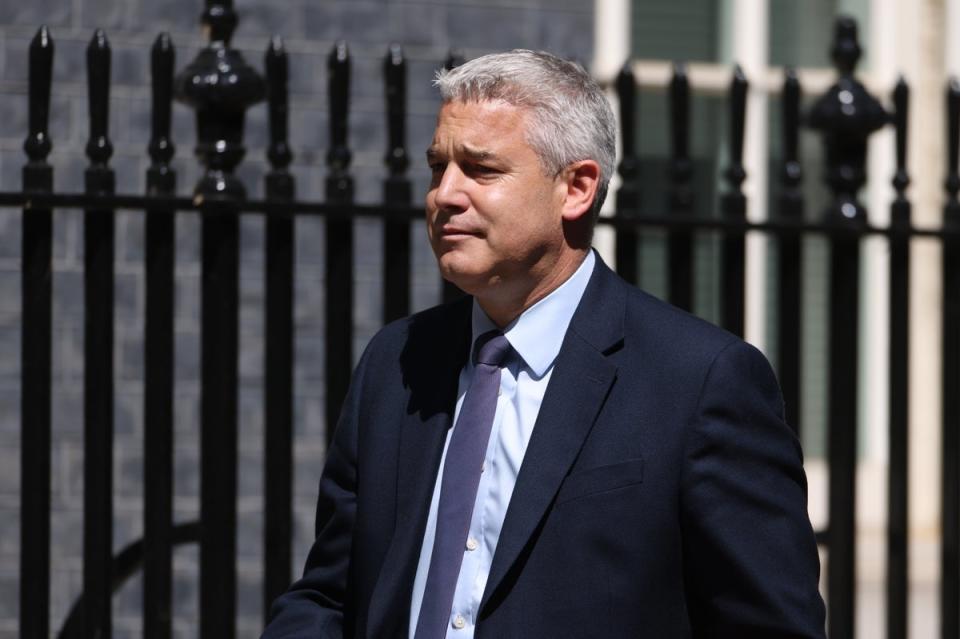Health Secretary is told frontline staff believe NHS has ‘collapsed’

Senior health staff believe the NHS has “collapsed”, MPs heard, prompting concerns over patient safety when demand increases in the winter.
Health Secretary Steve Barclay sought to play down concerns raised by senior frontline clinicians, but acknowledged bed occupancy rates have “broadly remained at winter-type levels”, with “high” Covid cases in July among the reasons.
He said efforts are being made to deal with delayed discharges from hospitals, with numbers also similar to winter months at around 13,000 patients.
One of my constituents, when she raised that with the NHS, was told by the senior consultant at the A&E department that the NHS has collapsed. If senior frontline clinicians are saying that in the summer, God help us when we get to the winter
Justin Madders MP
Several MPs raised concerns over waits for ambulances, with Labour’s Justin Madders (Ellesmere Port and Neston) telling the Commons: “I’ve had some horror stories from constituents this summer about the dangerous delays they’ve faced with life-threatening conditions.
“One of my constituents, when she raised that with the NHS, was told by the senior consultant at the A&E department that the NHS has collapsed.
“If senior frontline clinicians are saying that in the summer, God help us when we get to the winter.
“I really fear where we’re going to be with this because there’s no doubt my constituent is very lucky to be alive.”
Mr Madders asked Mr Barclay to give an estimate on the number of people who have died “unnecessarily” because they have been stuck in an ambulance waiting to get into A&E or because an ambulance did not turn up.
In London in July, the average wait time for an ambulance for somebody describing the symptoms of a stroke was more than an hour - more than three times longer than the target time
Helen Hayes MP
Mr Barclay responded to “some of that more colourful language” by highlighting increases in doctors, nurses and paramedics.
He said: “We’re training more, we’re meeting more demand but we recognise – this is why significant additional funding has been applied to ambulance trusts, call handling and to other parts of the system, including primary care, because part of reducing the demand on the ambulance system is also in terms of the GP capacity, which is why – to take that as an example – an additional £1.5 billion of funding has gone in.”
Labour MP Helen Hayes (Dulwich and West Norwood) also warned: “In London in July, the average wait time for an ambulance for somebody describing the symptoms of a stroke was more than an hour – more than three times longer than the target time.
“Many of my constituents told me that they are living with genuine fear and anxiety that if they or a loved one are stricken by illness or involved in a serious accident the emergency help they need simply won’t get there in time.”
It’s estimated that the collapse of emergency care that we’re now seeing could be costing 500 lives a week
Shadow health secretary Wes Streeting
Mr Barclay has previously said cutting ambulance waiting times will be the “number one priority” for the health service in England this winter.
Making a statement to the Commons on Monday, he said: “Bed occupancy rates have broadly remained at winter-type levels, with Covid cases in July still high at one in 25 testing positive.
“That compares to around one in 60 currently. This is without the decrease in occupancy that we would normally expect to see after winter ends.
“And ambulance wait times have also continued to reflect the pressures of last winter, although I am pleased to see recent improvements. For example, the West Midlands today is meeting its category two time of less than 18 minutes.”
On the issue of delayed discharges from hospital, Mr Barclay said: “The most recent figures from the end of July show that the number of these patients is just over 13,000, similar numbers to the winter months.
“And we’ve been working with trusts where delayed discharge rates are highest, putting in place intensive on-the-ground support.”
He said “discharge front-runners” will be “tasked with testing radical solutions to improve hospital discharge”.
Shadow health secretary Wes Streeting said emergency care “is in crisis”, adding: “29,000 patients waited more than 12 hours in A&E in June, more than ever before; 10,000 urgent cases waited more than eight hours for an ambulance last month.
“It’s estimated that the collapse of emergency care that we’re now seeing could be costing 500 lives a week.”
He went on: “The NHS needs Government ministers to grip this crisis and work tirelessly to get patients the care they need, so where has the Government been all summer?
“It’s almost as if the moment the Conservative leadership candidates hit the road, that the Cabinet turned on their out-of-office on and hit the beach.”

